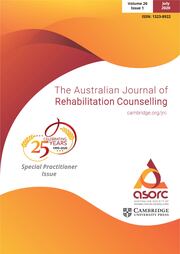Crossref Citations
This article has been cited by the following publications. This list is generated based on data provided by
Crossref.
Takanashi, Shiho
Sakka, Mariko
Sato, Iori
Watanabe, Shu
Tanaka, Shota
Ooshio, Ayumi
Saito, Nobuhito
and
Kamibeppu, Kiyoko
2017.
Factors influencing mother–child communication about fathers with neurobehavioural sequelae after brain injury.
Brain Injury,
Vol. 31,
Issue. 3,
p.
312.
Flores Stevens, Lillian
Hinesley, Jennifer L.
Stewart, Anne
Atwood, Kelly
and
Pickett, Treven C.
2017.
Relevance of Attachment Theory to Parenting Concerns Among Veterans With TBI.
Current Treatment Options in Psychiatry,
Vol. 4,
Issue. 3,
p.
241.
MacQueen, Ruth
and
Fisher, Paul
2019.
The Palgrave Handbook of Male Psychology and Mental Health.
p.
601.
Savary, Maréva
Lesage, Jessica
and
Michallet, Bernard
2020.
Programme de soutien aux habiletés parentales de parents ayant subi un traumatisme craniocérébral modéré à grave : une étude exploratoire.
Revue de psychoéducation,
Vol. 49,
Issue. 1,
p.
47.
Alcorn, Neil
2020.
A case report outlining clinical work with a mother with acquired brain injury and her infant son.
Advances in Mental Health,
Vol. 18,
Issue. 1,
p.
17.
MacQueen, Ruth
Fisher, Paul
and
Williams, Deirdre
2020.
A qualitative investigation of masculine identity after traumatic brain injury.
Neuropsychological Rehabilitation,
Vol. 30,
Issue. 2,
p.
298.
Cregan, Karen
Daisley, Audrey
Ford, Catherine
and
Gracey, Fergus
2022.
A qualitative exploration of fatherhood after acquired brain injury (ABI).
Neuropsychological Rehabilitation,
Vol. 32,
Issue. 9,
p.
2269.
Pituch, Evelina
Bindiu, Anna Maria
Grondin, Myrian
and
Bottari, Carolina
2022.
Parenting with a physical disability and cognitive impairments: a scoping review of the needs expressed by parents.
Disability and Rehabilitation,
Vol. 44,
Issue. 13,
p.
3285.
Aunos, Marjorie
Spencer, Margaret
Pacheco, Laura
and
Pituch, Evelina
2024.
This changes everything: a critical reflection on the impact of internalized ableist constructs on becoming a disabled mother.
Disability & Society,
Vol. 39,
Issue. 5,
p.
1079.
Pituch, Evelina
Ben Lagha, Rym
Aunos, Marjorie
Cormier, Tiffanie
Carrier, Annie
Gagnon, Cynthia
Gilbert, Véronique
Dominique, Aysha
Duquette, Antoine
Turcotte, Marie
Wakil, Rose-Marie
and
Bottari, Carolina
2024.
“What Services?”: Stakeholders’ Perceived Unmet Support Needs for Parents With Neurological Disorders.
Canadian Journal of Occupational Therapy,
Vol. 91,
Issue. 2,
p.
160.


